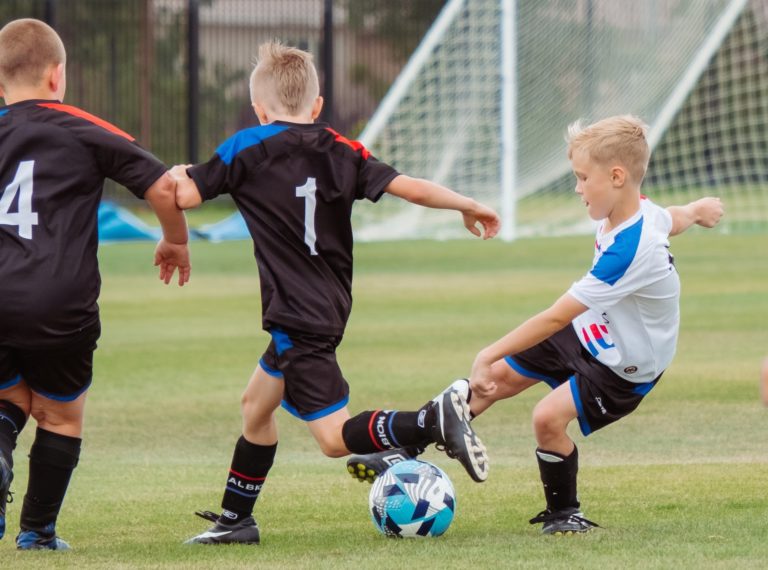Are you torn between letting your children stay glued to their phones indoors or encouraging them to go outside and play? While staying home might seem like the safer option, there are countless reasons why the latter choice is actually better.
Sports and outdoor activities offer a multitude of benefits for our children’s physical and emotional well-being. They are essential for the development of cognitive abilities, social skills, confidence, and a well-rounded life. In this article, we will delve into why kids should play sports and explore ways to support and encourage them in doing so. So, let’s stick together until the end and create a healthy and fun-filled childhood for our little ones!

Reasons That Your Kids Should Play Sports
Nothing happens without reason, and as caring parents, it’s important to understand why we encourage our children to engage in certain activities. In the case of sports, let’s explore why it’s beneficial for your kids to participate.
1. Promotes an Active Lifestyle
Sports play a vital role in promoting a healthy lifestyle for our children. It’s no surprise that physical activity enhances flexibility, strengthens bones, aids in weight management, and keeps children at bay from depression and anxiety. Moreover, when kids start playing sports early in life, they are more likely to maintain an active lifestyle throughout adulthood, reaping the benefits of long-term fitness.
2. Helps Learn Sportsmanship
Life isn’t always about winning; sometimes, we experience setbacks and disappointments. Sports teach children how to handle these challenges and take control of difficult situations. Through sportsmanship, kids learn valuable lessons in resilience, grace, and managing worrisome circumstances, shaping their character beyond the game.
3. Develops Teamwork Skills
“United we stand, divided we fall.” And what better way to teach our kids about unity than through sports? Team-oriented sports like football, cricket, and volleyball require collaboration and cooperation. By participating in team sports, children develop better communication skills, learn to make collective decisions and cultivate respect for their teammates. The shared experiences and challenges foster lifelong friendships.
4. Helps Learn Time Management
Time management is a critical skill that sets the foundation for success in all aspects of life. By enrolling your child in sports activities, you encourage them to balance their time effectively. They’ll learn to prioritize practices, complete homework on schedule, and maintain a well-balanced routine. Sports provide an excellent framework for instilling valuable time-management skills early on.
5. Sports are a Fun Way to Spend Time
In a world dominated by screens, it’s natural to worry about our children’s excessive phone usage. However, by involving them in outdoor sports and games, we can provide them with engaging alternatives. Instead of playing virtual cricket, they can experience the thrill of playing the sport outside. By participating in sports, our kids develop a healthy lifestyle while having a blast, steering clear of the sedentary trap.
6. Teaches Them Social Skills
Sports are inherently social activities. From team play to coaching guidance, sports foster interaction and communication. Regular engagement with teammates, coaches, and fans allows children to refine their social skills, effectively express themselves, and develop strong bonds. Through sports, our kids learn to step out of their comfort zones, collaborate with others, and overcome challenges together.
7. Improves Mental Health and Cognitive Abilities
Overindulgence in books or mobile devices can negatively impact our children’s mental health. Outdoor activities provide a necessary break for their minds to rejuvenate and stay active. Furthermore, sports require coordination between hands, feet, and the mind in almost every aspect. Whether it’s basketball, where players must think while running and passing, or any other sport, the cognitive demands improve mental agility and boost cognitive abilities.

How to Help Your Kids Get the Most Out of Playing Sports?
Now that you know why kids should play sports, let’s dive into how your kids can make the most out of their sports experience. Active involvement from parents can truly enhance the benefits of playing sports. Even if your kids aren’t initially interested, you can guide them, cheer them on, and even join in the fun. Here are a few things you can do:
Spread the Encouragement: Everyone loves a little positive reinforcement! Whenever your kids achieve something, big or small, make sure to acknowledge their hard work and provide words of encouragement. It goes a long way in boosting their confidence.
Be Their Biggest Supporter: Show up for your children, be present at their games, discuss their performances with them, and most importantly, support them even if they lose. Unconditional support helps them grow and improve, both on and off the field.
Set Realistic Goals: Avoid placing unrealistic expectations on your child. Instead, set achievable and realistic goals for them. This approach prevents disappointment and allows them to celebrate each step they take, building their confidence along the way.
Make Time for Talks: Schedule regular talk time with your children to foster a strong bond. During these conversations, discuss their experiences, and learn about the game they’re playing, their team members, and any setbacks they may be facing. It helps them feel lighter and more confident when they can share their thoughts with you.

What to Do if Your Kid Doesn’t Like Playing Sports?
Not every child is inclined towards sports, and that’s okay! Many of us used to dread our P.E. classes too. To prevent your kids from hiding or skipping their sports activities, try the following:
Don’t Force Them: Forcing a child or constantly pressuring them can create frustration. Instead, be patient and gradually develop their interest in sports. Allow them to choose their preferences, ensuring they genuinely enjoy what they’re doing.
Explore Different Sports and Activities: Encourage your children to try out various sports, games, and activities. Kids love exploring new things, so take them to different sporting events or activities. If skiing isn’t their cup of tea, maybe they’ll love skating or hiking. By exposing them to different options, you’ll help them discover their true interests.
Embrace Incidental Exercise: Incorporate physical activity into their daily lives by encouraging incidental exercise. Instead of taking the elevator, suggest taking the stairs. Swap scooter rides for short walks. These small changes promote an active lifestyle, prevent laziness, and keep them fit for sports and games.
Respect Their Likes and Dislikes: Just as our parents may have pushed us towards a certain sport, we should avoid doing the same to our children. Forcing them into something they dislike can create resentment towards you and the game itself. Let them make their own choices and support them in pursuing activities they genuinely enjoy.
Revisit Sports Later: It’s important to remember that preferences can change over time. Just as our taste buds evolve or our fashion choices vary, so can our affinity for sports. If your child currently dislikes a particular sport, don’t write it off completely. In the future, suggest giving it another try, and who knows, they might develop a newfound love for it.
Remember, every parent wants the best for their child. Encouraging their participation in sports can lead to physical fitness and emotional strength. However, it’s crucial to approach it with patience, gradually nurture their interests, expose them to different activities, and ultimately support them in their chosen path. By doing so, you’re making a lasting and positive impact on their lives. Your kids will surely appreciate it later on!
Summary
Every parent dreams of providing their child with the best opportunities in life and one of the greatest gifts is introducing them to sports from an early age. It’s a fantastic way to nurture their physical well-being and emotional resilience. However, we all know that forcefully pushing kids into sports can have the opposite effect, leaving them with a distaste for anything athletic.
That’s why the key is to take a gradual and playful approach. Encourage them step by step, expose them to a variety of activities, and most importantly, join in the fun with them! By doing so, you’ll ignite their interest in at least one sport, and that’s where the magic begins.
Remember, patience is key. As you patiently guide your children towards outdoor adventures and playful competitions, you’re making a decision that will shape their lives in the best possible way. Trust me, they’ll thank you for it later, as they embark on a journey filled with joy, growth, and a lifelong love for sports!

Cecilia Yeung is a successful entrepreneur and product researcher. She has a background in psychology and children’s education. As a working mother of two, she loves to write about children’s education and development.







